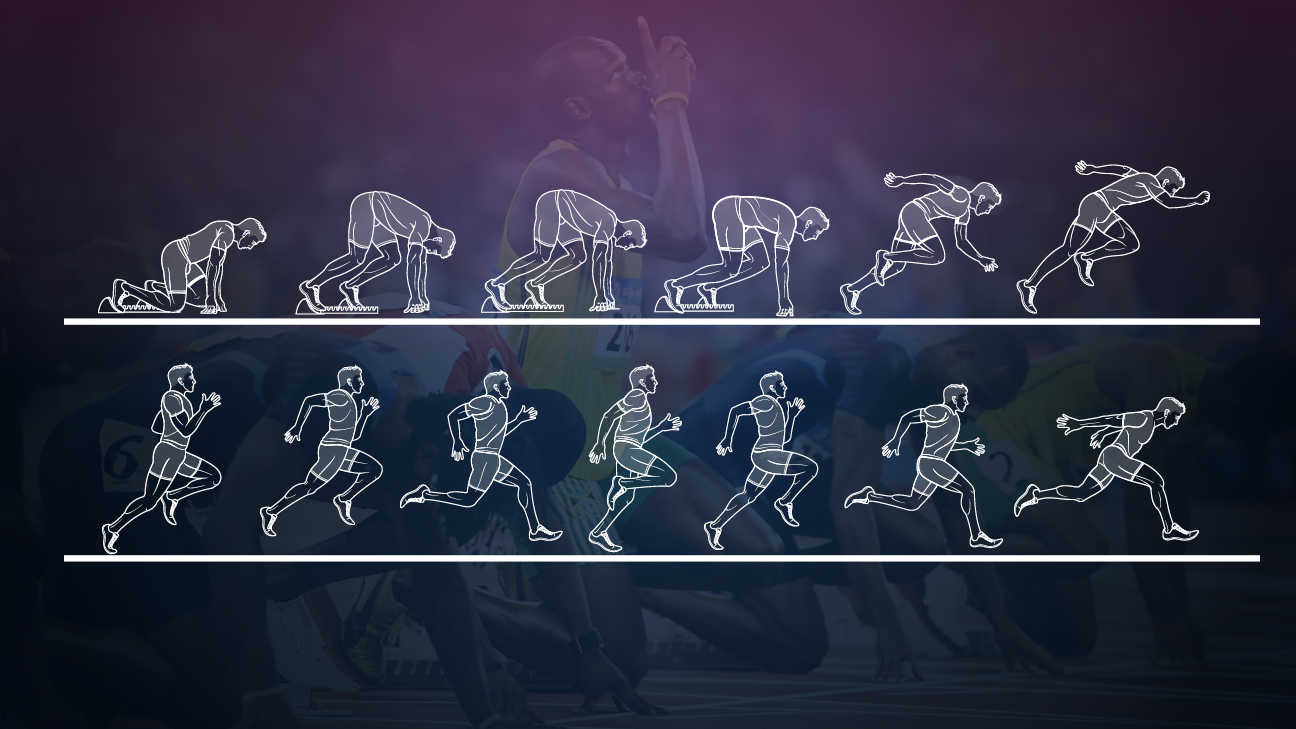
And that's when, she says, "I kind of snap out of it. Gardner says that when she is running, a lot of times she gets into a zone where she doesn't see or hear anything from her competitors. "You need to stay relaxed and let the finish line come to you." "That's the hardest part of the 100 meters," he says. And once you're up there trying to get it, you're going to fall down."

Going forward, going back, arms are flailing you're reaching for something that's not there. If I get greedy and start searching for something else, then I'm losing all my technique, losing my balance. So after 70 meters I have to be sure I'm running strong, running tall and getting to the finish line. "Theoretically, man is not supposed to run faster after 70 meters. You need to stay calm and run to the finish line." Gatlin says that's what caused him to lose that race: "You get caught up in the excitement, you want more, you try to go for more, and you just lose yourself. Then he stumbled slightly, his arms began to flail and he lost to Bolt by an eyelash, 9.79 to 9.80. He was in the lead and had a chance to finally beat Bolt. Gatlin did at last year's world championships in Beijing. Sprinters occasionally make terrible mistakes at this point. You actually end up pressing and slow down even faster." "People tend to get to 70 and think, 'Oh, I'm going to kick it into another gear,' but that doesn't happen. "At 70 meters, you've got to maintain and keep those knees up," says Bromell. It isn't that dramatic a drop - Boldon says the best will slow down by maybe 2 mph - but it is enough to make the difference. But everybody, no matter who they are, as long as you are a human, you are decelerating in that last third of the 100." "If you see somebody pull away, it's because they are decelerating less than the others. "Everybody in that last 35 to 40 meters is decelerating," Boldon says. Boldon says the belief that some are able to get faster at this stage is a myth, or at least an illusion caused by seeing someone pulling ahead. Everyone slows down by 70 meters, if not earlier. When you watch a 100-meter race, you might think that a sprinter pulling away near the end is gaining speed on everyone. You're trying to overcome inertia and gravity in the first part of that race." You have to get some relative angle to the back of that car. "If you have to push something heavy, you're not going to push it from a 180-degree angle. "That's exactly what I tell my young kids," says Boldon, now a track and field analyst for NBC Sports who also does some coaching. And that's how you get out of the blocks." And all the way until you extend to the next step. And when you push it, you stay on the first step and extend all the way until the next step. "If your car runs out of gas, you don't go ahead and pull it," Lewis says. He says the key is not to take immediate quick steps, but to take longer, more powerful strides because that will help you farther along in the race. Less experienced runners might try to rise up quickly and take quick steps to put themselves into an early lead, but two-time Olympic 100 gold medalist Carl Lewis differs. "If you're thinking, 'Are my arms too wide, are my arms too close together?' it's over for you. "I'm like, 'All right, I'm waiting for the gun and getting set,'" says Gatlin, the 2004 Olympic 100 gold medalist. They should take a deep breath and hold it.Īmerican Justin Gatlin says the start is all about instinct. In addition to listening for that starter's pistol, Warren Doscher writes in "The Art of Sprinting," sprinters must make sure their feet are properly set and that the balls of their feet, ankles, knees and hip joints are in alignment. If you anticipate it and you're wrong, you're going to be out." "You don't want to anticipate the gun you want to react to it.

"A lot of races are won and lost because a sprinter does not react properly to the gun," says two-time Olympic 100 medalist Ato Boldon of Trinidad and Tobago. Therefore, if you start sooner than a tenth of a second after the gun, it will be considered a false start. Research has shown that a person cannot hear the gun and react in under a tenth of a second. You can even be disqualified if you start too soon after the gun fires. The rules used to be that you could false start once and be given a second chance. I just try to listen for the gun and react." The worst thing you can do is false start. You can't do anything else until the gun goes off. "Listen for the gun," says English Gardner, America's top female sprinter. Apart from the men wondering how they might beat Bolt, there is one thing sprinters say they are focused on after they position themselves in the starting blocks.


 0 kommentar(er)
0 kommentar(er)
